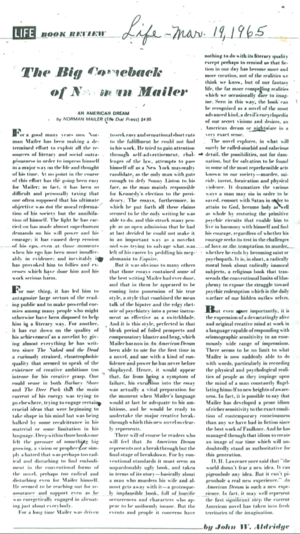The Big Comeback of Norman Mailer
From "The Big Comeback of Norman Mailer". Life. March 19, 1965. p. 12. Though they are in-process, copyright permissions have not yet been secured for this review. If you are the copyright holder, please contact the editor. |

For a good many years now, Norman Mailer has been making a determined effort to exploit all the resources of literary and social outrageousness in order to impress himself in a major way on the life and thought of his time. At no point in the course of his effort has been going been easy for Mailer; in fact, it has been so difficult and personally taxing that one often supposed that his ultimate objective was not the moral reformation of a society but the annihilation of himself. The fight he has carried on has made almost superhuman demands on his willpower and his courage; it has caused steep erosion of his ego, even at those moments when his ego has been most insufferably in evidence; and evidently it has provoked him to follies and excesses which have done him and his work serious harm.

For on thing, it has led him to antagonize large sectors of the reading public and to make powerful enemies among many people who might otherwise have been disposed to help him in a literary way. For another, it has cut down on the quality of his achievement as a novelist by giving almost everything he has written since The Naked and the Dead a curiously strained, claustrophobic quality that seems speak of the existence of creative ambitions too intense for his creative grasp. One could sense in both Barbary Shore and The Deer Park that the main current of his energy was trying to go elsewhere, trying to engage certain crucial ideas that were beginning to take shape in his mind but was being balked by some recalcitrance in his material or some limitation in his language. Deep within those books one felt the pressure of something big growing, in vision or prophecy or simply a hatred that was perhaps too radical and disturbing defined embodiment in the conventional forms of the novel, perhaps too radical and disturbing even for Mailer himself. He seemed to be reaching out for the reassurance and support even as he was energetically engaged in alienating just about everybody.
For a long time Mailer was driven to seek easy and sensational short cuts to the fulfillment he could not find in his work. He tried to gain attention through self-advertisement, challenges of the law, attempts to pass himself off as a New York mayoralty candidate, as the only man with guts enough to defy Sonny Liston to his face, as the man mainly responsible for Kennedy’s election to the presidency. The essays, furthermore, in which he put forth all these claims seemed to be the only writing he was able to do, and this struck many people as an open admission that he had at last decided he could not make it in and important way as a novelist and was trying to salvage what was left of his career by pedaling his megalomania to Esquire.
But it was obvious to many others that those essays contained some of the best writing Mailer had ever done, and and that isn't them he appeared to be coming into possession of his true style, a style that combined the mean talk of the hipster and the edgy rhetoric of psychiatry into a prose instrument as effective as a switchblade.
An American Dream Expanded.
